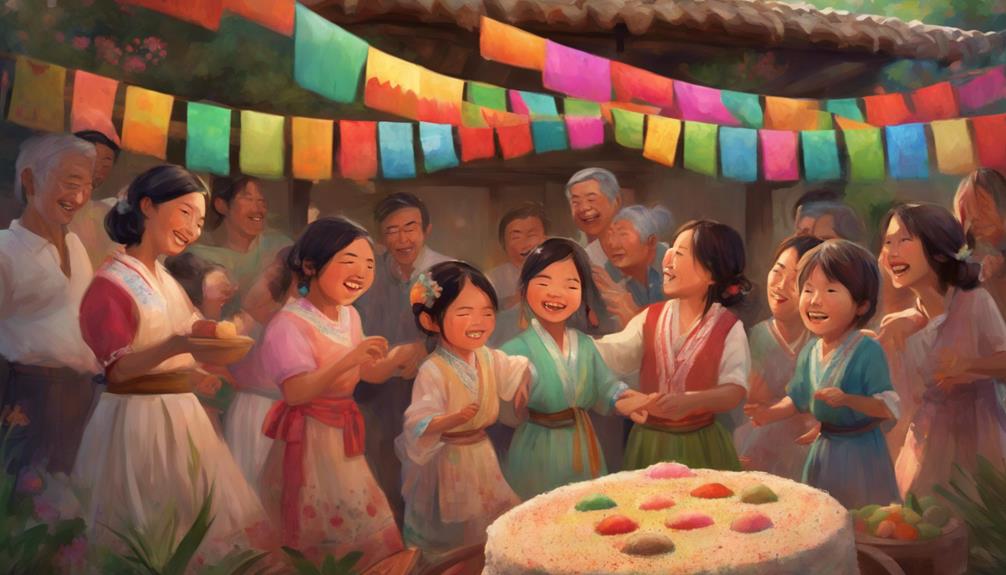The celebration of birthdays is a universal phenomenon, yet the customs and traditions associated with this event vary greatly across different cultures. From the elaborate ceremonies in India to the intimate gatherings in Japan, each culture brings a distinct perspective on commemorating the passage of time. Exploring how various societies mark this occasion not only sheds light on their values and beliefs but also underscores the interconnectedness of humanity. As we delve into the diverse ways in which birthdays are celebrated worldwide, a tapestry of unique rituals and practices emerges, inviting us to contemplate the significance of these festivities in a global context.
Key Takeaways
- Welsh culture values symbolic birthdays, especially the 21st, marking maturity and independence.
- Egyptian celebrations involve dancing, traditional dishes, and vibrant decorations symbolizing life and prosperity.
- Nigerian birthdays are extravagant, emphasizing feasting, music, and community to celebrate milestones.
- Vietnamese Tet celebrations focus on good luck, prosperity, and communal well-wishes with Lucky Money exchanges.
Welsh Birthday Traditions
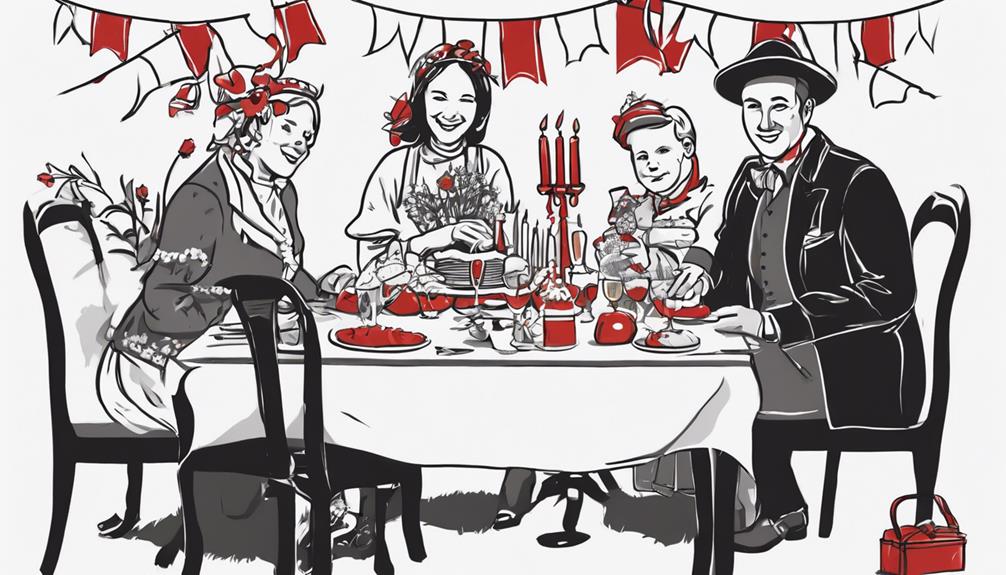
In Welsh culture, the celebration of birthdays holds significant symbolic value, particularly exemplified by the tradition surrounding a boy's 21st birthday. Welsh birthday traditions play a crucial role in signaling the transition into adulthood. When a Welsh boy turns 21, he receives a key symbolizing maturity and the unlocking of doors to freedom and independence. This key is not merely a physical object but a powerful symbol of the responsibilities and privileges that come with adulthood in Welsh society.
Welsh tradition dictates that on this significant birthday, parents often ease off on close monitoring, allowing the young man to take control of his possessions and decisions. This shift marks a pivotal moment in the individual's life, signifying the readiness to embrace adult responsibilities. Welsh birthday customs, centered around acknowledging adulthood and freedom, emphasize the importance of reaching this milestone age as a rite of passage into a new stage of life.
Egyptian Birthday Customs
Egyptian birthday customs involve vibrant celebrations with dancing, singing, and unique decorations that include fruits and flowers. Traditional practices like earlobe pulls for good luck are observed, and popular songs are played to create a festive ambiance. Guests often bring food items or flowers as customary gifts, enriching the joyous atmosphere of Egyptian birthday parties.
Egyptian Birthday Traditions
Birthday celebrations in Egypt are characterized by lively dancing, vibrant decorations, and unique traditional practices. Here are some key elements of Egyptian birthday traditions:
- Dancing, Singing, and Decorations: Egyptians celebrate birthdays with joyous dancing, traditional songs, and colorful decorations adorned with fruits and flowers.
- Earlobe Pulling Tradition: A distinctive Egyptian custom involves gently pulling the earlobes of the birthday individual for good luck and blessings.
- Traditional Songs: Popular songs are played during Egyptian birthday parties to create a festive ambiance and enhance the celebratory mood.
- Gift-Giving: Guests often bring food items or flowers as gifts to Egyptian birthday celebrations, adding to the sense of community and shared joy.
Popular Egyptian Birthday Foods
Popular culinary choices associated with celebratory occasions in Egypt often include traditional dishes like kahk and basbousa, which hold significance in cultural festivities. These sweet treats are commonly enjoyed during Egyptian birthday celebrations. Alongside these desserts, fruits such as watermelon, dates, and figs are frequently served. Egyptian birthday feasts also feature savory dishes like kofta, grilled meats, and rice pilaf, adding a rich variety to the meal. To complement the flavors, celebrants often indulge in drinks like hibiscus tea, known as karkadeh, and traditional Arabic coffee. Additionally, desserts like baklava, a pastry filled with nuts and honey, are popular choices at Egyptian birthday gatherings. This culinary selection reflects the traditional and festive nature of Egyptian birthday customs.
Egyptian Birthday Party Decorations
The visual ambiance of Egyptian birthday celebrations is heightened by a vibrant display of colors, lively dancing, melodious singing, and an abundance of fresh fruits and blossoms. This traditional decoration style symbolizes life, growth, and prosperity, reflecting the cultural significance of nature and abundance in Egyptian celebrations. Guests commonly contribute to the festive atmosphere by bringing gifts of food items or flowers, further enhancing the overall festive mood. The use of vibrant colors, along with fruits and flowers, creates a visually rich environment at Egyptian birthday parties, known for their lively and joyous atmosphere. The decorations play a crucial role in setting the tone for the celebration, emphasizing the values of life, growth, and abundance in Egyptian culture.
- Vibrant display of colors
- Abundance of fresh fruits and blossoms
- Symbolizes life, growth, and prosperity
- Guests contribute with gifts of food items or flowers
Nigerian Birthday Celebrations
Nigerian birthday celebrations are characterized by the tradition of inviting a significant number of guests, particularly for milestone birthdays. The cuisine at these celebrations often features Jollof rice made with roasted cow or goat, incorporating special ingredients like peppers, onions, and sweet potatoes. Nigerians tend to celebrate birthdays extravagantly, especially for significant ages, often including feasts with roasted cow or goat as a central dish.
Nigerian Birthday Traditions
Celebrating birthdays in Nigeria involves vibrant feasting, lively music, and the sharing of gifts among a large number of guests, particularly during the initial fifteen years of life. Nigerian birthday traditions are rich and colorful, reflecting the country's diverse culture and values. Here are some key elements of Nigerian birthday celebrations:
- Jollof Rice Delicacy: A popular dish made with roasted cow or goat, peppers, and sweet potatoes.
- Lively Music and Dancing: Nigerian birthday parties often feature energetic music and dancing to create a festive atmosphere.
- Gift Sharing: Guests exchange gifts to mark significant milestones and show appreciation.
- Recordatorias as Party Favors: It is customary to give two recordatorias as tokens of appreciation to guests attending the celebration.
These traditions emphasize the joyous and communal nature of Nigerian birthday festivities.
Gifts and Blessings
In Nigerian birthday celebrations, the exchange of gifts and blessings plays a significant role in marking important milestones and fostering communal ties. Guests are expected to bring food items or flowers as gifts, contributing to the festive atmosphere. Traditional dishes like Jollof rice, prepared with roasted cow or goat, are commonly served, adding a cultural touch to the celebration. Nigerians often invite a large number of guests, especially for significant birthdays such as the first fifteen, emphasizing the importance of community and shared joy. Special ingredients like peppers, onions, and sweet potatoes are incorporated into birthday cuisine, enriching the feast. Overall, feasting and celebrating extravagantly are integral parts of Nigerian birthday traditions, reflecting the country's vibrant and communal approach to marking special occasions.
Celebration Feasts
With a focus on communal bonding and culinary richness, birthday celebrations in Nigeria are characterized by elaborate feasts that showcase a vibrant cultural tapestry.
Celebration Feasts in Nigerian Birthday Celebrations:
- Large Gatherings: Nigerians invite numerous guests, especially for significant birthdays, fostering a sense of community through shared meals.
- Jollof Rice: A beloved dish featuring roasted cow or goat, symbolizing the country's passion for flavorful and aromatic cuisine.
- Special Ingredients: Peppers, onions, and sweet potatoes are commonly used, imparting unique and bold flavors to birthday feasts.
- Lavish Celebrations: Marking important milestones with extravagant feasts underscores the value Nigerians place on commemorating life events with loved ones.
Nigerian birthday celebrations are renowned for their festive ambiance, delectable dishes like Jollof rice, and the spirit of togetherness that defines these joyous occasions.
Vietnamese Birthday Practices
Vietnamese birthday practices center around Tet, the first day of the New Year, symbolizing the essence of life and growth. During these celebrations, red envelopes containing Lucky Money are commonly given to birthday boys and girls in Vietnam. This tradition holds significant cultural value as it symbolizes good luck and prosperity. Interestingly, in Vietnamese culture, there is an emphasis on collectively giving Lucky Money to children during Tet, highlighting the communal aspect of these celebrations. Beyond the exchange of red envelopes, Vietnamese birthday festivities involve the exchange of gifts and well wishes for health and prosperity. The Tet birthdays in Vietnam not only mark the passing of another year but also underscore the importance of life, growth, and familial blessings. By incorporating these traditions into their birthday celebrations, the Vietnamese people reinforce the values of luck, prosperity, and togetherness within their culture.
Irish Birthday Festivities
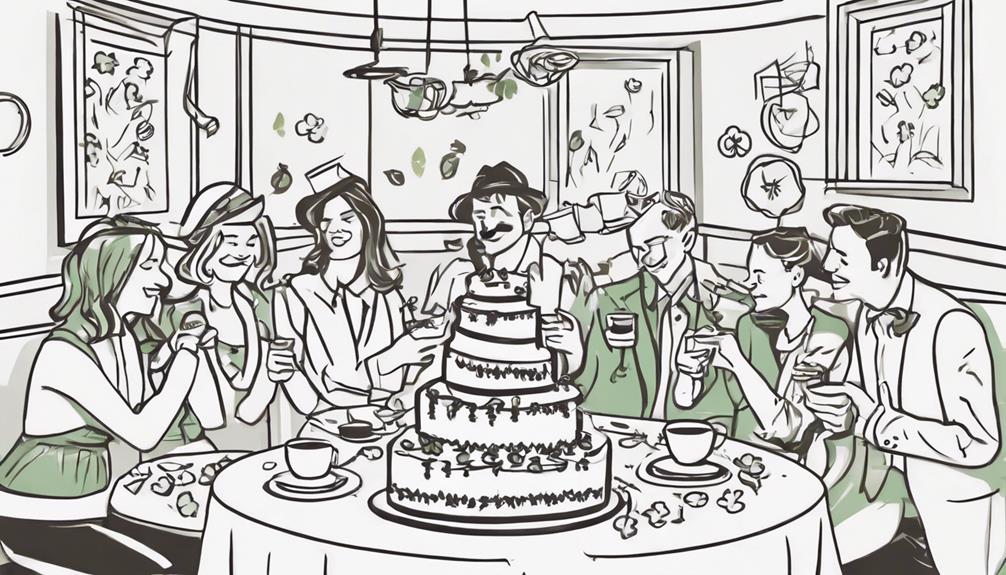
Irish birthday festivities involve a unique and playful tradition of lifting birthday children upside down and lightly bumping them, with the number of bumps corresponding to the child's age, an additional bump added for good luck. This playful bumping tradition is deeply rooted in Irish birthday celebrations and is a way to bring joy and laughter to the occasion. Here are some key aspects of Irish birthday traditions:
- Upside-Down Bumping: Birthday children are lifted upside down and gently bumped, with each bump symbolizing a year of their life. This ritual adds a fun and whimsical element to the celebration.
- Symbolic Meaning: The act of bumping the birthday child is not only a playful gesture but also a way to wish them good luck and prosperity in the coming year.
- Cultural Significance: The playful bumping tradition reflects the Irish culture's emphasis on warmth, affection, and close-knit family bonds during birthday festivities.
- Joyful Celebrations: Irish birthday festivities are characterized by laughter, merriment, and a sense of togetherness, making the occasion memorable and special for the celebrant.
Brazilian Birthday Traditions
Embracing a cultural tradition that symbolizes good luck, Brazilian birthday celebrations feature a unique practice of pulling the earlobes of the birthday person. This act is believed to bring good fortune and ward off evil spirits, adding a touch of fun and excitement to the festivities. Another significant aspect of Brazilian birthday traditions is the first slice of cake. The first slice is considered special and is often shared with close family and friends as a symbol of togetherness and joy.
In addition to these customs, Brazilian birthday parties are known for their unique and humorous traditions aimed at creating lasting memories. Guests often bring small gifts or flowers as tokens of appreciation for the host. Special dresses are worn at these celebrations, adding to the festive atmosphere. The gatherings typically involve singing, dancing, and heartfelt gifting, making Brazilian birthday parties a vibrant and joyous occasion for all involved.
Cuban Birthday Rituals
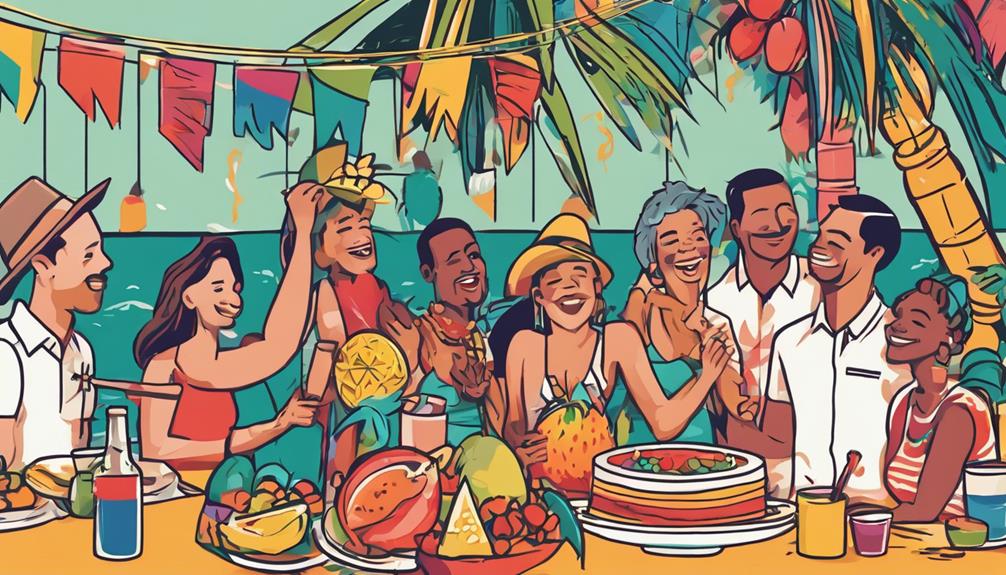
Cuban birthday rituals encompass a rich tapestry of traditions that emphasize communal gatherings and cultural expressions.
Key Aspects of Cuban Birthday Celebrations:
- Family and Friends Gathering: In Cuba, birthdays are often celebrated with the presence of loved ones. Family and friends come together to honor the individual and share in the joyous occasion.
- Feast of Traditional Cuban Dishes: A common tradition during Cuban birthday celebrations is the indulgence in a delicious feast featuring traditional Cuban dishes. These culinary delights add a flavorful touch to the festivities.
- Music and Dancing: Music and dance are integral components of Cuban birthday parties. The rhythmic beats and lively movements contribute to the vibrant atmosphere and create a sense of joy and celebration.
- Birthday Cakes with Tropical Flair: Birthday cakes in Cuba are a popular feature, adorned with tropical fruits and vibrant colors. These visually appealing cakes add a touch of tropical charm to the celebration, enhancing the overall festive spirit.
Korean Birthday Customs
In the realm of Korean cultural traditions, the observance of birthdays holds significant importance, particularly marked by the elaborate festivities surrounding the first birthday, known as 'Doljanchi' or Dol. During this celebration, a traditional Doljabi ceremony takes place, where symbolic items are laid out for the child to choose, each representing a different future path or trait. Red bean rice cakes and seaweed soup are commonly served during Korean birthday celebrations, symbolizing good health and longevity. Additionally, money envelopes, known as 'doljumeoni,' are given to the child as a gesture of prosperity and good fortune in their future endeavors. Korean first birthdays are often grand affairs, with family and friends coming together to honor the child's growth and well-being. This emphasis on tradition, symbolism, and communal celebration highlights the cultural significance placed on birthdays in Korean society.
Danish Birthday Celebrations
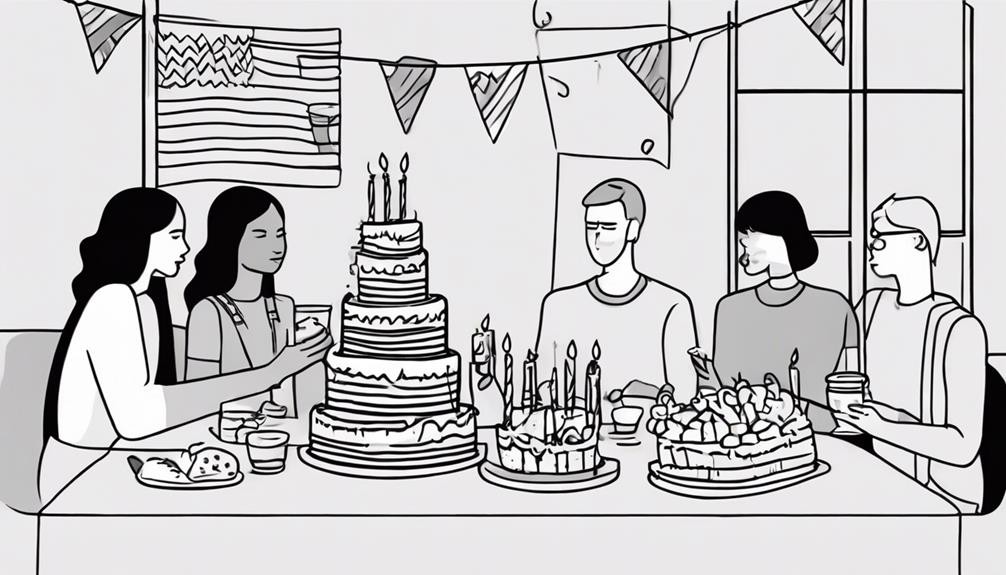
Continuing our exploration of birthday celebrations across cultures, Danish birthday customs are characterized by unique traditions and practices that reflect the country's rich cultural heritage and community-centered values.
- Danish Flag: In Denmark, birthdays are celebrated with a Danish flag adorning the breakfast table, symbolizing national pride and festivity.
- Mols Bjerge: Danish birthday celebrations often involve singing the traditional birthday song 'Mols Bjerge,' adding a touch of cultural significance and musicality to the event.
- Kings and Queens: A popular game played at Danish birthday parties is 'Kings and Queens,' where the birthday person is honored and treated like royalty, emphasizing respect and celebration of the individual.
- Responsibility for Cake: The birthday person in Denmark is responsible for providing cake for their guests, showcasing a sense of generosity and hospitality within Danish birthday traditions.
These customs, including the display of a birthday calendar at home, demonstrate the importance of family, tradition, and community in Danish birthday celebrations.
Frequently Asked Questions
Are Birthdays Celebrated in Every Culture?
Birthdays are not universally celebrated in all cultures. The significance and manner of acknowledging birthdays vary depending on cultural traditions. Some cultures place a strong emphasis on individual birthdays with elaborate celebrations, while others may focus on collective events or other milestones. Understanding these cultural differences sheds light on the diverse ways in which birthday traditions are observed globally, highlighting the rich tapestry of global celebrations.
How Does the Mexican Culture Celebrate Birthdays?
Traditional fiestas in Mexican culture are vibrant celebrations that honor birthdays with rich customs. Festivities include the melodious serenade of 'Las Mañanitas' by Mariachi bands, unique cake face-smushing rituals, and the excitement of breaking piñatas. Mexican cuisine plays a key role, with Tres leches cake being a popular treat. Cars adorned with post-its add surprise elements. These traditions reflect the lively spirit and warmth of Mexican birthday celebrations.
How Does the Chinese Culture Celebrate Birthdays?
In Chinese culture, birthdays are marked with a blend of traditional customs and modern influences. Chinese traditions dictate the importance of age, with specific ages considered particularly auspicious or unlucky. Birthday rituals often involve serving longevity noodles, red-dyed eggs, and peach symbols for longevity. Festive gatherings are common, where wearing red for luck is customary. The adoption of birthday cakes has also become prevalent, symbolizing the blending of cultural significance and contemporary practices in Chinese birthday celebrations.
What Is a Traditional Way to Celebrate a Birthday?
When honoring a birthday in various cultures, a common thread is the significance of rituals and traditions that symbolize growth, unity, and joy. Festive decorations, the presence of a birthday cake, and the exchange of gifts are customary. These practices not only mark the passing of another year but also serve as a reminder of the cultural importance of celebrating milestones. The observance of these traditions brings communities together in shared moments of happiness and reflection.
Conclusion
In conclusion, diverse cultures around the world celebrate birthdays in unique ways that reflect their traditions and values. For example, in Nigerian birthday celebrations, it is common to have a large gathering with music, dance, and traditional food to commemorate the special day. These various customs and practices highlight the richness and diversity of global birthday festivities, showcasing the importance of cultural traditions in shaping celebratory events.
